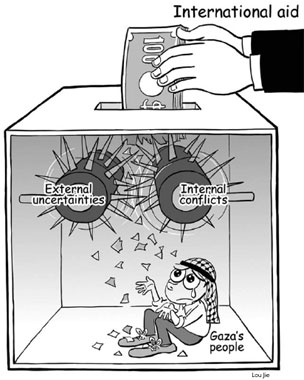2009年3月11日,朱威烈教授在《中国日报》“观点”专栏中发表了《Time to convert promises into reconstruction》一文(Opinion Column, China Daily, 03/11/2009)。文章说,尽管加沙重建的国际会议已经落幕,从各方承诺的援助金额44.81亿美元看,已经远远超出巴勒斯坦权力机构法耶德总理提出的28亿美元计划要求。然而,要把这笔资金转化成实实在在的加沙重建项目,纾解加沙人民危殆的生活状况,显然还有一个艰难的过程。全文如下:
Time to convert promises into reconstruction
By Zhu Weilie
At the recently concluded international conference in the Egyptian city of Sharm el-Sheikh, for the reconstruction of the Gaza Strip, the $4.48 billion donation promised by all parties far exceeded the requested $2.8 billion proposed by Salam Fayed, Prime Minister of Palestinian National Authority.
Converting the money into real reconstruction projects in Gaza in order to relieve the desperate living condition of its people, however, still has quite a way to go.
The 22-day-long Gaza conflict between the end of last year and the beginning of this was a result of domestic partisan electoral conflicts in both Palestine and Israel. Assuming that the tenure of President Mahmoud Abbas would soon expire, Hamas, aiming to replace Fatah, shot rockets into southern Israel to resist the latter's siege.
Israel's Kadima- Labor coalition government immediately responded with "Operation Cast Lead" in order to fend off the pressure from Likud before the February election.
Excessive retaliation killed at least 1,330 Palestinians and wounded tens of thousands, leaving Gaza in rubble. To relieve the catastrophe, the United Nations, the international community and regional organizations responded with promises to provide aid.
The Gaza reconstruction conference was held with such an international consensus.
Both Palestine and Israel unilaterally declared a ceasefire, but both are conditional. Armed conflicts occur regularly, indicating it is only a fragile agreement. Two conundrums need urgent solutions.
First, who will lead the reconstruction? It seems that the Palestinian National Authority led by President Abbas should be in charge, since he is the Palestinian representative in the Sham el-Sheikh conference, and reconstruction funds are also allocated to his government.
Since the conflict between Fatah and Hamas in July 2007, however, the Gaza Strip has been in fact controlled by Hamas. Recently Fatah and Hamas reached an agreement to set up a unified national government. However, the coalition between the two Palestinian parties is still unsure.
Second, one of the crucial conditions of Palestine's ceasefire is that Israeli authorities must open all border checkpoints to allow aid to be transported into Gaza.
The Emud Olmert administration of Israel stressed that it would consider opening the checkpoints only if Palestine releases an Israeli soldier kidnapped in 2006.
The Likud, which has already been authorized to organize the cabinet, has not even acknowledged the "road map" plan proposed by the Quartet on the Middle East. It means Likud has not agreed to basic principles of reopening negotiations and allowing an independent Palestinian state.
If the access of Gaza to the outside world is not settled, reconstruction will only happen on paper.
Gaza's reconstruction is contingent on the unification within Palestine and the concessions of Israeli authority. It requires that regional powers, including Egypt and Saudi Arabia, continue to mediate between Fatah and Hamas, the United States and Europe exert their influence on Israel, and for peace to hold. The most critical factor will be how the new Middle East policy, under US President Barack Obama, balances US relations with Israel and with Arabic and Islamic countries.
President Obama is willing to change US attitudes toward Islamic countries - seeking dialogue with Iran and Syria, for example - which were accused by the Bush administration as "evil" states. In regard to Israel, the US' core ally in the Middle East, Obama has vowed to maintain the alliance and defend Israel's security. It is still unclear, however, how he will deal with the country's hardliners.
The US's Middle East policies are also relevant to its domestic politics - more than 80 percent of Jewish Americans voters voted for the Democrats.
Hence, the international Gaza reconstruction conference attended by Secretary of State Hillary Clinton achieves substantial progress and has become the touchstone of US-Arabic and US-Israeli relations, and the focus of regional and international public opinion.
At the moment, caretaker Prime Minster Olmert, trapped by domestic troubles, is almost impossible to make great policy changes, while Benjamin Netanyahu has to turn to the right wing, after Kadima and Labor refused to join his cabinet. An emerging question is whether the Netanyahu administration will agree to the relatively balanced new Middle East policy of the Obama administration.
The reconstruction of Gaza will be very difficult to carry out. It still needs enormous efforts from all stakeholders, regional powers, and the international community.
The author is a Professor with Middle East Studies Institute of Shanghai International Studies University.

来源:China Daily